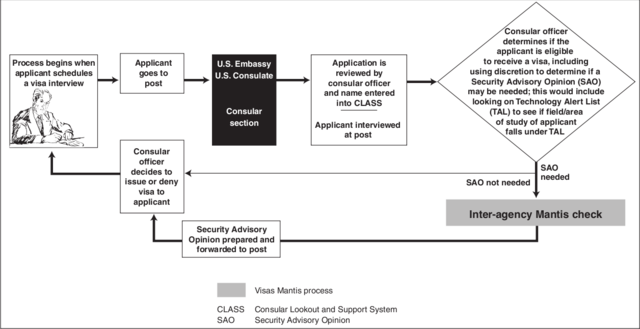Administrative processing is the term U.S. Citizenship and Immigration Services (USCIS) used to refer to a delayed application or petition when an application or petition requires additional review by an immigration official.
Under section 221(g) of the Immigration and Nationality Act, an applicant goes through a green card process at a U.S. embassy or consulate abroad. During the process, an immigration officer will process your case and request the applicant to go through an additional layer of security. There might be a scenario where an immigration officer needs an additional form to file out.
Visa Security Layer Process
Also known as Security Advisory Opinion (SAO) or Washington special clearance, it is the period during which visa applications undergo additional review outside of the “normal” visa processing times. The SAO is a process where The United States Department of State grants or denies visa applications. The Department of State is a multi-level agency involving the FBI, CIA, Interpol, DEA, FAC, and many other agencies.
This multi-level review takes place after the visa interview. Before issuing a visa, consular officers review different databases to determine if information exists that may impact individual eligibility for a visa.
During this determination a “notice” on a particular database occurs when there is a match between the visa applicant and a tag in the database system. These notices may be based on criminal convictions, security risks, and prior visa overstays or denials. When an individual case has been tagged in a database, the Department of State, at the request of the consular post, may initiate administrative processing.
Fear & Concerns
The opaque nature of this process is why immigrant communities typically fear or dislike the administrative process. Because people do not want to go through this anxious process, it is crucial to hire a lawyer to submit all forms and requirements properly. It’s prevalent during stressful times to forget what is required or additional items that should be brought to an interview because application preparations were not made correctly.
When an immigration official only requests additional information, this can be good news that leads to short administrative processing.
Why Was I Selected For Administrative Processing?
Common reasons agencies or immigration officials have suspensions:
- Your case needs to be consulted by the FBI.
- There is still an internal legal review occurring.
- Unlawfully exporting possession of technology.
- An immigrant might be a part of a terrorist organization or gang.
- When an applicant has access to sensitive technology information, referred to as the MANTIS security advisory opinion.
There’s an extensive list of reasons why administrative processing will take place. Some of these reasons lead to short administrative processing, while other items lead to more extended administrative processing.
Furthermore, when an immigration official further investigates the reasoning as to why an immigrant needs administrative processing, the embassy is not typically involved.
The embassy will, however, hold the immigrant’s case until they receive an answer from an agency or immigration official. Please note that administrative processing has an indefinite timeline, so the parties involved don’t know when they’ll receive an answer.
What Should I Do After The Administrative Processing?
- A list of things to do after the administrative processing is;
- Contact an attorney who has dealt with these types of investigations.
- Provide an attorney with the context of the conversation that took place.
- Keep a note of any unique details that are mentioned during the conversation.
- Mention every question to your attorney that was asked of you by an immigration official.
- Make a copy and give your attorney any letter or documents provided to you during this time.
This information is critical in identifying clues and possible scenarios that can take place. The information gathered and provided to an attorney will make a clear picture of how severe the case is and how to approach the case in a cautious but objective manner.
What If I Have Multiple Visa Applications?
If the applicant at the embassy has multiple visa applications available at the time of processing, they should present them to the immigration officers. The reason to do this is that the administrative process is specific to your green card process. When there’s an alternative visa application, you can use that visa to stay in the U.S. This backup plan would save you from traveling back to your former resident country.
Can You Check Your Status?
Not in the beginning, but because of regulations, the process times for administrative processing should be around 180 days. During this time, green card applicants shouldn’t make any inquiries. Asking for an inquiry status from an immigration official will most likely delay the process due to the added work given to the immigration official.
There have been instances where an applicant inquired before 180 days. When this has happened, the immigration official typically states that the case is still being worked on and that they are within a reasonable time to process the case. If 180 days have passed, the applicant should inquire through the state department weekly so the case won’t get lost.
When an applicant inquires, they should also check the Consular Electronic Application Center (CEAC) website. The website can check for a status update on the administrative processing case. Once there is an update on the website, contact the embassy and tell the immigration office of the new status. A contact form should be within the portal when checking case status updates.
Note: The case on the CEAC site will show “refused.” This status does not mean your case is denied. This status means your case is currently pending.
